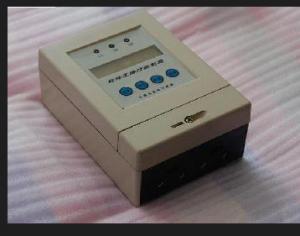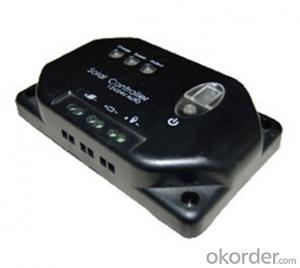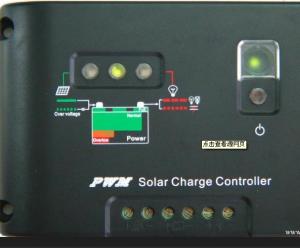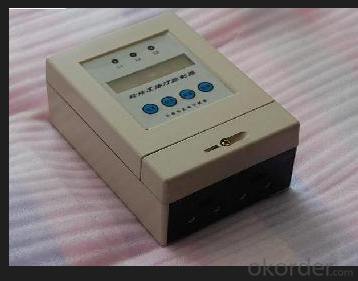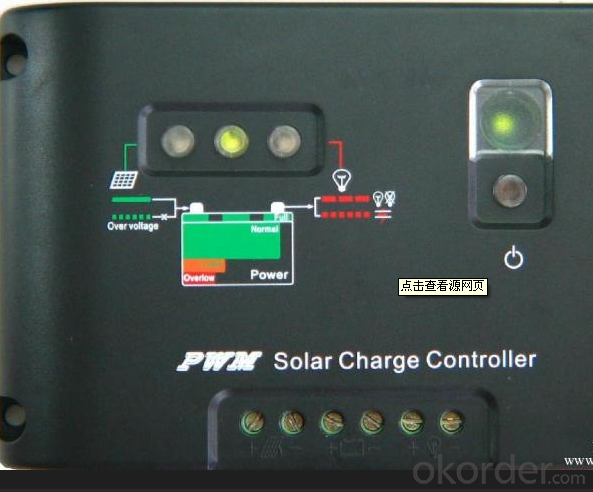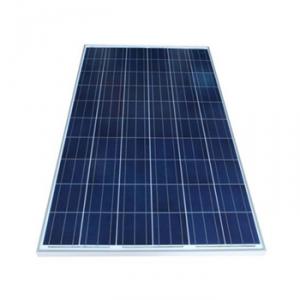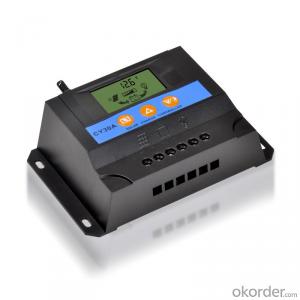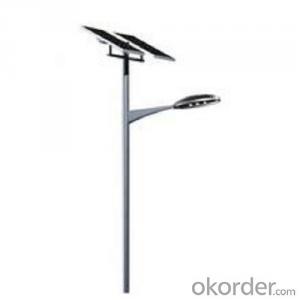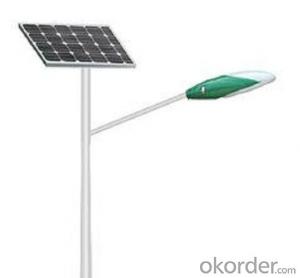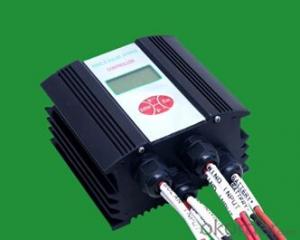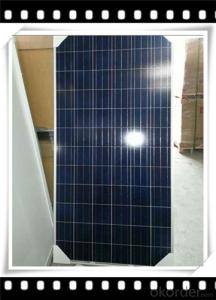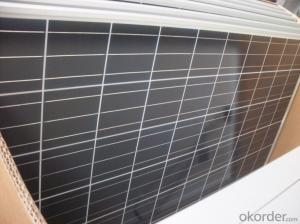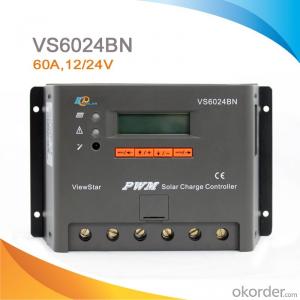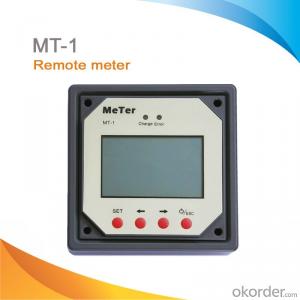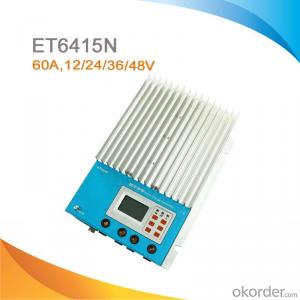Solar Panel Charge Controllers PV Street Light Controller from China CNBM
- Loading Port:
- China Main Port
- Payment Terms:
- TT or LC
- Min Order Qty:
- -
- Supply Capability:
- -
OKorder Service Pledge
OKorder Financial Service
You Might Also Like
Description
CNBMSOLAR is a world-leading and Vertical integrated manufacturer of high-performance with Silicon,
Wafer, Cells, Modules, which convert sunlight into electricity for residential, commercial, and utility-scale
power generation.
The capacity of CNBMSOLAR is reach to 1GW, and make sure each year our shipment capacity is more
Than 700-800MWs, at the same time, we have set up the largest solar power station with our partner
in Ukraine.
CNBM is a Quality + Service oriented company with“Excellence at Each Step” approach, composed of
the finest components from TUV and IEC-certified partners around the world, CNBM modules consistently
undergo a variety of trials at the company’s Test & Development Centre, ensuring peak performance
capabilities. The company is committed to develop and provide the world with clean and renewable energy
to ease the energy shortages as well as human kind’s impact on the environment.
Data:
Model | GSR-1010CL-TAW | GSR-5010CP-TAW | |
Rated Capacity(A) | 10 | 10 | |
Rated Voltage(VDC) | 24 | 24 | |
Max.load current(A) | 10 | 10 | |
Max.charging current(A) | 10 | 50 | |
Charge Loops | 1 | 1 | |
Load Loops | 1 | 2 | |
Max. Open Circuit Voltage(VDC) | 50 | 50 | |
Overcharge protection | 28.4 | 28.4 | |
Overdischarge protection | Switch-Off | 21.6 | 21.6 |
Resumption | 26.4 | 26.4 | |
Current Without Load(mA) | 20 | 20 | |
Display | LED | indicator light | |
operating Model | 1.Light control time interval setting | 1.Light control time intervals setting Note:Already set before sent to customers | |
Temperature compensation | No | optional | |
Lightning protection devices(standard) | Varistors Lightning Protection | Varistors Lightning Protection | |
Protection | Overcharge, Overdischarge,overload, short circuit, reverse polarity, lightning arrestor | ||
Protection class | IP20 | ||
Voltage Descent | Between Solar battery and lead-acid battery | 0.7 | 0.7 |
Between lead-acid battery and load | 0.03 | 0.03 | |
Noisy(dB、1m) | ≤50 | ≤50 | |
Operating temperature(℃) | -20~+50 | -20~+50 | |
Storage temperature(℃) | -25~+55 | -25~+55 | |
Operating humidity | 0~95%(non-condensing) | 0~95%(non-condensing) | |
Operating Altitude(m) | ≤5000 | ≤5000 | |
Reference diamension(DxWxH)mm | 80×130×28 | 96×130×50 | |
Reference weight(Kg) | 0.5 | 3.0 | |
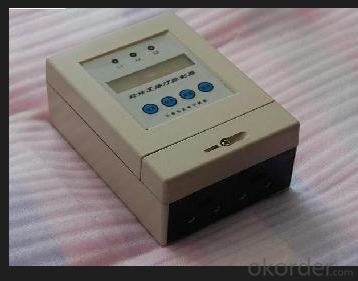
FAQ:Pls introduce more about CNBM
CNBM Group is short for China National Building Materials Group Corporation, which is established in 1984 with approval from the State Council
CNBM Group is the largest comprehensive building materials industry group in China
The Group has a total asset of over RMB 360 billion, more than 180,000 employees and 17 subsidiaries
- Q: Can a solar controller be used in an agricultural solar system?
- Yes, a solar controller can be used in an agricultural solar system. A solar controller is responsible for regulating the charging and discharging of batteries in a solar system, ensuring optimal performance and preventing overcharging or damage. In an agricultural solar system, where solar panels are used to power irrigation systems, livestock fences, or other agricultural equipment, a solar controller is crucial for efficient energy management and maintaining the longevity of the batteries.
- Q: What is the maximum self-consumption of a solar controller?
- The maximum self-consumption of a solar controller refers to the amount of energy that the controller itself consumes from the solar system it is regulating. This consumption typically includes the power needed to operate the controller's circuitry, display, and connectivity features. The specific maximum self-consumption can vary depending on the model and design of the solar controller, but it is generally minimized to ensure optimal energy efficiency and maximize the amount of solar power available for usage or storage.
- Q: Can a solar controller be used with solar trackers?
- Solar trackers can indeed be used in conjunction with solar controllers. The primary purpose of a solar controller is to regulate and optimize the battery charging process within a solar power system. It achieves this by monitoring the voltage and current generated by the solar panels, ensuring efficient and safe charging of the batteries. In contrast, solar trackers are devices that track the sun's movement throughout the day, continuously aligning the solar panels with its position. This maximizes the solar energy output by constantly optimizing the orientation of the panels. Motors or actuators are employed to adjust the panel's position accordingly. Despite their distinct functions, solar controllers and solar trackers can be utilized together in a solar power system. The solar controller will be connected to both the solar panels and batteries, managing the charging process. Simultaneously, the solar tracker will continuously adjust the panel's position to capture the maximum amount of sunlight. By combining these technologies, the solar power system can reap the benefits of increased energy generation and enhanced battery charging efficiency. Consequently, this leads to an overall improvement in system performance and energy output.
- Q: How do I protect a solar controller from overheating?
- To protect a solar controller from overheating, there are several steps you can take: 1. Proper installation: Ensure that the solar controller is mounted in a well-ventilated area, away from direct sunlight and other sources of heat. This will help to prevent excessive heat buildup. 2. Adequate sizing: Make sure the solar controller is properly sized for your solar panel system. Undersized controllers may struggle to handle the load, leading to overheating. Consult the manufacturer's specifications or seek professional advice to ensure the controller is suitable for your system. 3. Check ambient temperature: Monitor the ambient temperature around the solar controller regularly. If the temperature rises above the recommended operating range, consider relocating the controller to a cooler area or installing additional ventilation. 4. Use heat sinks: Consider using heat sinks or heat dissipation devices, especially if the solar controller is located in a confined or enclosed space. Heat sinks help to absorb and dissipate excess heat, preventing it from building up and damaging the controller. 5. Install thermal sensors: Many advanced solar controllers come equipped with built-in thermal sensors that can detect excessive heat and automatically shut down or reduce the load on the controller. If your controller does not have this feature, you can consider installing external thermal sensors to monitor and trigger protective measures when necessary. 6. Ensure proper wiring: Faulty or loose wiring can increase resistance and cause the solar controller to overheat. Regularly inspect the wiring connections and ensure they are secure, tight, and properly insulated. If you notice any signs of damage or overheating, address the issue immediately. 7. Regular maintenance: Regularly clean and inspect the solar controller for any debris, dust, or dirt accumulation, as these can impede proper heat dissipation. Use a soft brush or compressed air to clean the controller gently. By following these steps, you can help protect your solar controller from overheating and ensure its optimal performance and longevity.
- Q: What is the cost of a solar controller?
- The cost of a solar controller can vary depending on several factors such as brand, capacity, features, and quality. On average, a basic solar controller can range from $20 to $50, while more advanced models with additional functionalities can cost anywhere from $50 to $200 or more.
- Q: What is the role of a solar controller in preventing damage to the solar panels from birds or animals?
- The role of a solar controller in preventing damage to solar panels from birds or animals is primarily to deter them from landing or nesting on the panels. Solar controllers typically use various deterrent mechanisms to achieve this. One common method is the use of ultrasonic sound waves that are inaudible to humans but are unpleasant to birds and animals. These sound waves create a hostile environment around the solar panels, making them less attractive to birds or animals seeking a perch or nesting spot. The solar controller emits these sound waves periodically, effectively keeping the area around the panels clear. Another approach used by solar controllers is the implementation of visual deterrents, such as reflective surfaces or moving objects. Birds and animals are often scared away by shiny or reflective surfaces, as they perceive them as potential predators or threats. Incorporating these visual deterrents into the solar controller's design helps to discourage birds and animals from approaching the panels. Furthermore, solar controllers may also utilize physical barriers or netting to block access to the panels. This prevents birds or animals from landing directly on the panels or damaging them with their claws or beaks. These physical barriers are designed to be lightweight and durable, ensuring they do not interfere with the solar panels' performance while effectively protecting them from potential damage. In summary, the role of a solar controller in preventing damage to solar panels from birds or animals is to create an environment that is unattractive and inhospitable to these creatures. By employing deterrent mechanisms such as ultrasonic sound waves, visual deterrents, and physical barriers, solar controllers help maintain the integrity and functionality of the solar panels by keeping birds and animals at bay.
- Q: How does a solar controller handle reverse current protection?
- A solar controller handles reverse current protection by using a diode or a solid-state switch to prevent current from flowing back into the solar panels when they are not generating power. This ensures that the energy generated by the panels is properly stored in the batteries and not wasted.
- Q: Can a solar controller be used in a solar-powered water pump system?
- Yes, a solar controller can be used in a solar-powered water pump system. A solar controller helps regulate the flow of electricity from the solar panels to the water pump, ensuring optimal performance and protecting the system components from damage. It also helps monitor and maintain the battery charge, preventing overcharging or deep discharge. Overall, a solar controller is an essential component in a solar-powered water pump system to maximize efficiency and longevity.
- Q: Solar controller red light flashing
- Solar controller flashing red light according to the different brands of the representative of the meaning of the controller are not the same, but in general terms, the red light flashing a saying that the battery is charging the battery is expressed as a red light flashing, green , The yellow light does not shine; another kind is the battery high pressure state or battery low voltage state that is red light flashing, green light does not light, hope to help you
- Q: Can a solar controller be used with a solar heating system?
- Yes, a solar controller can be used with a solar heating system. A solar controller is responsible for regulating and optimizing the performance of the solar heating system by managing the flow of heat transfer fluid, monitoring temperatures, and controlling pumps or valves. It helps maximize the efficiency and effectiveness of the solar heating system by ensuring that the collected solar energy is properly utilized for heating purposes.
Send your message to us
Solar Panel Charge Controllers PV Street Light Controller from China CNBM
- Loading Port:
- China Main Port
- Payment Terms:
- TT or LC
- Min Order Qty:
- -
- Supply Capability:
- -
OKorder Service Pledge
OKorder Financial Service
Similar products
Hot products
Hot Searches
Related keywords
